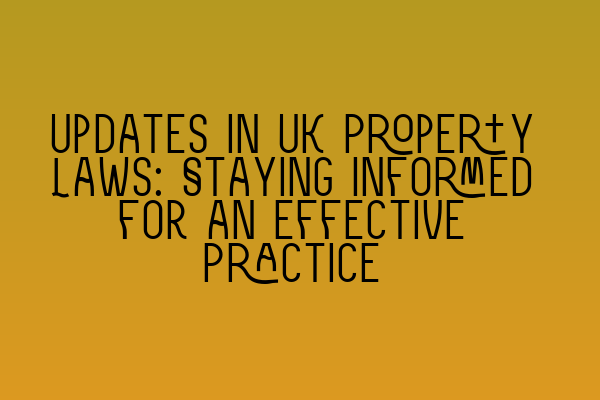Updates in UK Property Laws: Staying Informed for an Effective Practice
At SQE Property Law & Land Law, we understand the importance of staying up-to-date with the latest changes in UK property laws. As a solicitor, it is crucial to have a thorough understanding of these updates to ensure the delivery of effective and reliable legal services to our clients. In this blog post, we will discuss some of the recent updates in UK property laws and provide you with valuable insights on how to stay informed.
1. The Tenant Fees Act 2019: One of the significant updates in UK property laws is the introduction of the Tenant Fees Act 2019. This act imposes restrictions on the fees that landlords and letting agents can charge to tenants in England. As a solicitor, it is important to understand the implications of this act for both landlords and tenants. By staying informed, you can provide reliable advice to your clients and ensure compliance with the law. To learn more about the Tenant Fees Act 2019, you can read our insightful article on the topic.
2. Changes to Stamp Duty Land Tax (SDLT): SDLT is a tax that is payable on the purchase or transfer of land and property in the UK. There have been several changes to the SDLT thresholds and rates in recent years. Staying informed about these changes is vital to ensure accurate calculations and compliance with the law. To brush up on your knowledge of SDLT and its latest updates, we recommend reading our comprehensive article on the subject.
3. The New Model Commercial Lease (NMCL): The NMCL is a standard form lease that seeks to simplify and streamline commercial lease transactions. As a solicitor specializing in property law, it is essential to familiarize yourself with the provisions and structure of the NMCL. By doing so, you can provide efficient and effective lease drafting and negotiation services to your clients. To dive deeper into the NMCL and its impact on commercial lease transactions, check out our informative article.
4. Energy Efficiency Regulations: Sustainability and energy efficiency are becoming increasingly important in property transactions. The energy efficiency regulations aim to reduce carbon emissions and improve the energy efficiency of properties in the UK. As a solicitor, understanding these regulations can help you advise clients on compliance and integration of sustainable practices in property matters. To gain a comprehensive understanding of the energy efficiency regulations, read our detailed article on the topic.
5. The Electrical Safety Standards in the Private Rented Sector (England) Regulations 2020: These regulations require private landlords in England to ensure that the electrical installations in their properties meet certain safety standards. As a solicitor, being aware of these regulations is crucial to provide advice to landlords and tenants on their rights and responsibilities. To learn more about the electrical safety standards and their implications, we recommend reading our informative article.
Staying informed about these updates in UK property laws is vital for solicitors to provide effective legal services to their clients. By continuously educating yourself and keeping up with industry developments, you can ensure that you are well-prepared to navigate the ever-changing landscape of property law.
At SQE Property Law & Land Law, we offer comprehensive preparation courses for the Solicitors Qualifying Examination (SQE) to equip aspiring solicitors with the necessary knowledge and skills to succeed in their legal careers. If you’re preparing for the SQE exams, be sure to check out our practice exam questions and mock exams to enhance your exam readiness.
For more information about the SQE exams and their dates, visit our website to stay updated on exam schedules.
Remember, staying informed is the key to an effective practice in property law. Continuously educate yourself, stay up-to-date with the latest updates in UK property laws, and never stop learning and growing as a legal professional.
